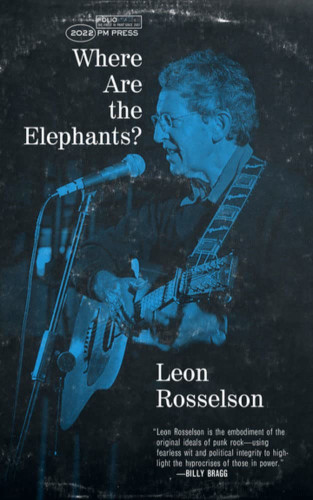‘A map of the world that does not include Utopia is not worth even glancing at, for it leaves out the one country at which Humanity is always landing. And when it lands there, it looks out and, seeing a better country, sets sail. Progress is the realisation of Utopias.’ – Oscar Wilde
This is one of three quotes from different thinkers that opens Leon Rosselson’s new book, which combines a 130-page memoir with a long-form interview by fellow songwriter Robb Johnson.
In short: if you like Rosselson’s songs, you’ll like this book. It contains the same balance of well-crafted stories, vivid human reflections and enough humour to lift the spirits whatever might be happening around us.
I laughed out loud throughout this book while also feeling at times the stomach-dropping realities of some of his experiences.
Born in 1940, Rosselson’s life spans some of the most turbulent times of change the human-inhabited world has ever known.
The way in which he guides us through the story of his own life takes us all back in time with him, whether we lived through it or not.
As a reader, I felt as if I was really there – experiencing the textures, tastes and sounds that he so vividly describes, but also experiencing the process of questioning ideology and human behaviour that threads through his life.
Leon Rosselson writes wordy songs, which puts him on solid ground for writing a long-form memoir.
If you have heard his songs, you will know how skilled a wordsmith he is, often tackling difficult, serious and painful topics with a twist of wit.
In a sort of epilogue to the memoir, a final chapter entitled ‘my life in songwriting (or how I failed to become rich and famous) in 23 episodes’ offers us 23 one-paragraph vignettes relating vivid moments in his life.
He describes a memory of running to his local Tube station, Tufnell Park, as London was being bombed, and tells us that ‘this memory is awakened every time I see film of people fleeing war’. Rosselson also tells us how he, a Jewish boy, was conned into going to church by the Christian woman he and his sisters were evacuated to in Somerset – she pretended that Mickey Mouse would be there!
Rosselson guides us from his experiences of a Second World War (and postwar) childhood, through his years of writing and sharing songs (not always well-received!), his criticism of the Israeli state, and the various problems threaded through socialist and labour politics in the UK, landing us finally in 2020 and the COVID pandemic.
This is one hell of a lot of ground covered, and Rosselson turns again and again towards the kind of intelligent questioning that must inform real dissent.
There is plenty of hope in these pages, as well as time taken to face some of the more painful truths of our time.


